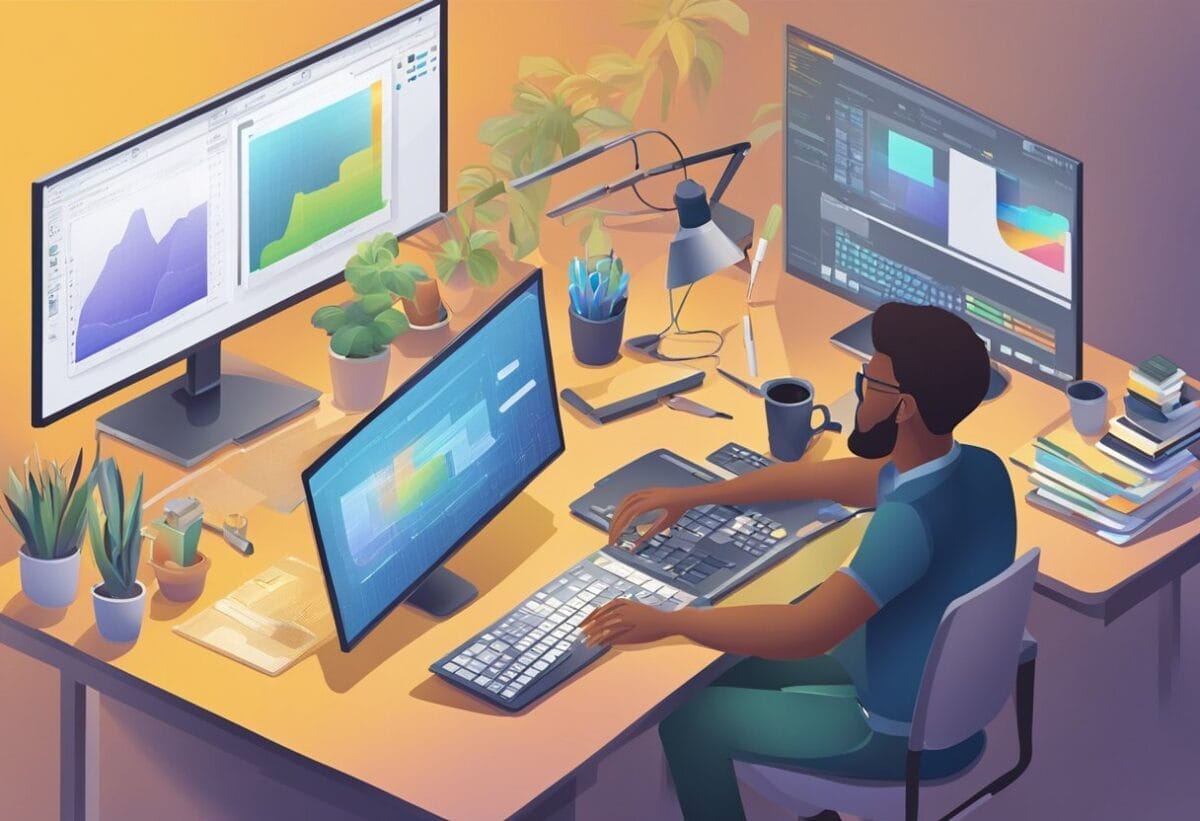When you’re asked about your experience with specific tools or skills, it is an interview question that give you a great chance to show off your abilities and stand out from other candidates. Give concrete examples of projects you’ve worked on and results you’ve achieved. This helps the interviewer picture how you’d apply your knowledge in their company.
When answering, focus on describing how you’ve used the software or skill in real-world situations.

Just keep your answer relevant to the job you’re applying for.
If possible, mention skills or tools listed in the job description. This shows you’ve done your homework and are a good fit for the role.
Key Takeaways
- Give specific examples of how you’ve used the skill or software in past work
- Highlight measurable results and achievements from using the tool
- Connect your experience to the requirements of the job you’re applying for
Why Do Employers Ask ‘Describe Your Experience With A Specific Software, Tool, Or Skill.’
Employers ask this question to learn about your technical abilities. They want to know if you can handle the job’s demands. They’re looking for proof of your expertise. Real examples of how you’ve used the software or tool are valuable. Your answer shows if you’re a good fit for the role. It helps them see how your skills match their needs.
Your answer can set you apart from other candidates. It’s your chance to showcase unique experiences or advanced skills.
- This question reveals your problem-solving skills. Employers want to know how you apply your knowledge in real situations.
- Employers are interested in your learning ability. They might ask about software you’re not familiar with to see how you’d approach learning it.
Your response helps them picture you in the role. Be confident and give specific examples of your experience.
Common Variations Of “Describe Your Experience With A Specific Software, Tool, Or Skill.”

Interviewers often ask about your experience in different ways. Here are some common variations you might hear:
- “How proficient are you with [specific software/tool/skill]?”
- “Tell me about a time you used [software/tool/skill] to solve a problem.”
- “What’s your level of expertise with [software/tool/skill]?”
These questions aim to understand your abilities better. Don’t worry if the wording is slightly different. The core idea remains the same.
You might also encounter more specific versions:
- “How long have you been using [software/tool/skill]?”
- “What projects have you completed using [software/tool/skill]?”
- “Can you walk me through your process when using [software/tool/skill]?”
These questions allow you to showcase your skills and experiences, so be ready to provide concrete examples of how you’ve used the software, tool, or skill in real-world situations.
How To Answer “Describe Your Experience With A Specific Software, Tool, Or Skill.”

Answering this question well can set you apart in an interview. Follow these steps to craft a strong response that showcases your abilities and experience.
Step 1: Name The Specific Software, Tool or Skill
Start by naming the software, tool, or skill you’ll discuss. Be specific. Instead of saying “coding,” mention “Python programming.” This shows you understand the question and helps the interviewer follow your answer.
Next, briefly state how long you’ve used it. For example: “I’ve been using Adobe Photoshop for five years.”
This gives the interviewer a quick snapshot of your experience level. It sets the stage for the details you’ll share next.
Step 2: Explain How Do You Attain The Skill or Use The Software or Tool
Explain where and how you learned the skill. Did you take a class? Learn on the job? Teach yourself?
For instance: “I first learned Photoshop in a college design course. Since then, I’ve expanded my skills through online tutorials and practical projects.”
This shows your commitment to learning and growing your skills. It also hints at your ability to adapt and learn new things.
Mention any certifications or special training you’ve completed. These add weight to your experience.
Step 3: Describe Your Experience With It
Describe how you’ve used the software, tool, or skill in real-world situations. Give specific examples from your work or personal projects.
For instance: “At my previous job, I used Photoshop daily to create marketing materials. I designed brochures, social media graphics, and website banners.”
Use numbers when possible. How many projects did you complete? How large was your audience?
This step shows you can apply your skills practically. It proves you’re not just familiar with the tool, but proficient in using it.
Step 4: Highlight Your Achievement
Highlight your achievements or successes related to this skill. Did you improve a process? Win an award? Receive positive feedback?
For example: “Using my Photoshop skills, I redesigned our company’s logo. This new design increased brand recognition by 30% according to our customer surveys.”
This step shows the value you can bring to the new role. It proves you’re not just a user of the tool, but someone who can drive results with it.
Don’t be shy about your accomplishments. This is your chance to shine!
Step 5: Connecting It With Your Job Role
Wrap up by connecting your experience to the job you’re interviewing for. How will your skills benefit the company?
For instance: “I’m excited to bring my Photoshop expertise to your marketing team. I believe my skills in creating eye-catching visuals will help boost your social media engagement.”
This shows you’ve thought about how you can contribute to the company. It also demonstrates your enthusiasm for the role.
Always keep your answer concise and relevant. Focus on the aspects of your experience that relate most to the job you’re seeking.
Practice your answer beforehand. This will help you feel more confident and articulate during the interview.
Best Example Answers To ‘Describe Your Experience With A Specific Software, Tool, Or Skill.’

When asked about your experience with a particular software, tool, or skill, it’s important to provide specific examples and highlight your proficiency. Your answer should demonstrate how you’ve applied your knowledge in real-world situations.
Example Answer For A Recent Graduate
Example Answer For An Experienced Candidate
“I’ve been using Microsoft Excel for over 5 years in my role as a financial analyst. I’m proficient in advanced functions like VLOOKUP, pivot tables, and macros.
One of my biggest achievements was creating a automated reporting system that saved our team 10 hours per week. It involved complex formulas and VBA scripting to pull data from multiple sources.
I’ve also trained junior staff members on Excel best practices. This improved our team’s efficiency by 20%. I stay updated on new Excel features through online courses and webinars.”
Example Answer For Applying For A Leadership Position
“As a project manager, I’ve used Jira for the past 3 years to lead cross-functional teams. I’ve set up and customized Jira boards for over 15 projects, each with unique workflows.
I implemented Jira in our marketing department, which improved task visibility and reduced project delays by 30%. I created custom reports that helped upper management track project progress more effectively.
I’ve also mentored team members on Jira best practices. This increased adoption rates and improved our overall project management processes. My experience has taught me how to leverage Jira to foster collaboration and drive results.”
Example Answer For An Industry Change
“While my background is in retail management, I’ve developed strong skills in data analysis using Python. I took online courses and worked on personal projects to build this skill.
One project involved analyzing customer purchase data to identify trends. I used pandas for data manipulation and matplotlib for visualization. This helped me understand how data analysis could improve business decisions.
I’ve also contributed to open-source projects, which improved my coding skills and taught me about version control with Git. These experiences have prepared me to transition into a data-focused role in the tech industry.”
Example Answer For A Career Change
“In my current role as a teacher, I’ve become proficient in using learning management systems (LMS) like Google Classroom. I’ve created and managed over 20 online courses, engaging students through interactive content and assessments.
I’ve also used data from the LMS to track student progress and tailor my teaching methods. This improved overall class performance by 15%.
As I transition to instructional design, these skills will be valuable in creating effective e-learning content. I’m excited to apply my experience with LMS platforms to develop engaging corporate training programs.”
Join over 11,000+ achievers who are committed to achieving their career goals!






